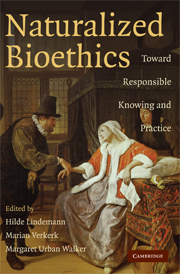Introduction: Groningen Naturalism in Bioethics
Published online by Cambridge University Press: 05 June 2012
Summary
Talk of “naturalizing” ethics carries different messages to different ears. If naturalism is a trend or a theme in many areas of philosophy at the beginning of the twenty-first century, it is not one trend or theme but several that may cohere or compete. Minimally, naturalism in ethics is committed to understanding moral judgment and moral agency in terms of natural facts about ourselves and our world. To some moral naturalists, this commitment means that moral judgments capture (or fail to capture) facts about the world that obtain independently of human opinion or feelings. Here naturalism means a metaphysical commitment to a kind of moral realism that can take forms as diverse as Aristotelian teleology and consequentialist appeals to facts about human welfare or happiness. For other naturalists, though, our capacities for moral judgment do not track truths in the world independent of us but are part of the naturally given expressive and adaptive equipment of human beings: we are a norm-hungry social species whose members need to coordinate actions and attitudes and that evolutionary pressure has “designed for social life.” These naturalists seek the explanation of our moral capacities in facts about the human beings, who, as a naturally occurring species, without recourse to supernatural or transcendent realities, bring morality into the world with them. Despite intense debate among realist and antirealist naturalists in ethics, there is widespread agreement that a scientific view of ourselves and the world is ultimately (and perhaps exclusively) authoritative, a touchstone and resource for naturalism in ethics.
- Type
- Chapter
- Information
- Naturalized BioethicsToward Responsible Knowing and Practice, pp. 1 - 20Publisher: Cambridge University PressPrint publication year: 2008
- 2
- Cited by

